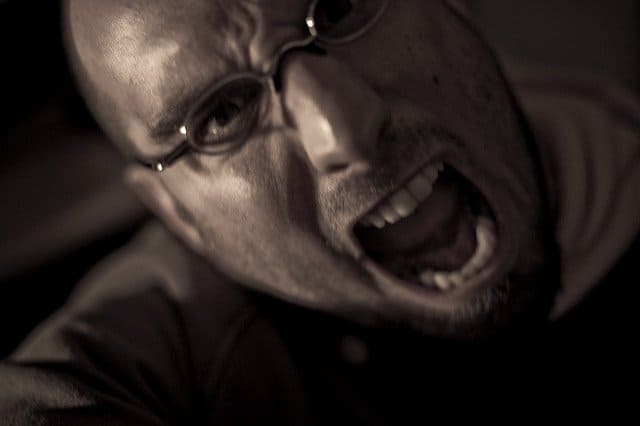Usually I try to sound eloquent when I speak with God. I attempt to impress upon God that eighteen years of Catholic education have taught me both appropriate communication with the Divine, as well as a strong foundation in English grammar. In prayer, God and I quaintly agree to use modest language:
“Dear God, I am fairly displeased with the way and manner unfortunate events have left me in a state of emotional uncertainty, a kind of limbo. Please help me see your work and to labor alongside you.
Thanks for listening,
Ken”
That’s my usual Advent prayer – gentle words spoken around a softly glimmering wreath. I patiently await the day of justice and Christ’s return to the world.
But frankly, I am tired. I am tired of trying to sound more perfect and pious than I truly am.
This Advent, I want to scream and curse. I want to do more than just “rend my garments.” I want to smash s*** with a baseball bat and give it the middle finger when I am done. And I want that to be my Advent prayer.
****
Perhaps my Advent prayer is like the author of Lamentations, voicing frustration both to and at God. Lamentations cries out in more than just sorrow. Jesuit theologian Richard J. Clifford states that Lamentations expresses “grief, anger, something near despair, acceptance, glimmers of hope and joy, and an indomitable will to carry on.”
Indeed, Advent turns to that glimmer of hope and joy. A common Advent image is the light fighting back the darkness. As winter collapses in around us, we turn to the flickering candlelight. We focus on the light we know is coming. We acknowledge that yearning for God’s justice and mercy.
But I cannot run from the darkness to the light. That would be unfaithful.
If I go straight to that light, then I deny the real pain and suffering around me, the darkness that I and others so deeply experience. I deny that I have hollered at my computer when reading news of hate crimes. If I go straight to the light, I deny the pain of my Latino students being told “Say goodbye to your parents.” If I go straight to the light, I reject the fear of my Muslim students, told that they are terrorists. If I go straight to the light, I tell my black students that swastikas and KKK symbols appearing in their neighborhoods are of no concern.
If I go straight to the light, I am telling my students that their fear is invalid and showing my friends that their grief is unfounded.
There in that darkness, I will cry out with fury and anguish like the author of Lamentations. In its opening chapter, Lamentations begs God for intervention and the restoration of Jerusalem: once a princess, but now a slave. It sorrows for a once-great city, reduced to poverty and destitution. It bemoans oppression, poverty, and abandonment.
My own Book of Lamentations? It would go like this: God, how could you let Flint get poisoned and left as a desert? How could you let foreign oppressors come and ravage the land of North Dakota? Why do those who swear in your name to protect others end up killing members of the community? Why are you idle as we enslave communities of color in cycles of poverty? What is with this bull s***? God, why the f*** did you abandon us, and when the hell are you coming back?
I am not the only one feeling this way. Recently, two Lutheran ministers took that spirit of frustration, hurt, and anguish, and found a way of praying with those emotions. Co-authors Tuina Verma Rasche and Jason Chesnut created “#F**kThisS**t: An Advent Devotional.”
Rasche states, “I had been filled with so much anger and so much rage because of police shootings, the destruction of black and brown bodies, and the racism and vitriol tied to the 2016 presidential election. These emotions fueled much of my writing and energies in the past months. I thought this anger and rage would keep me, in this body, fueled to write during the season of Advent, yearning for God’s justice in the midst of so much that has gone wrong in this calendar year.”
****
I am not trying to avoid the light of Advent and the impending coming of Christ. But I can’t simply dispel the darkness, thereby ignoring all the pain, tumult, and injustice found there. I stay in the darkness because that is where I can best perform my vocation as a Catholic, Jesuit, and teacher – standing in solidarity with those who cannot escape the darkness. I demand that God bring the light, destroying injustice and heartache. And damn it, until that day comes, I’ll be swearing and lamenting at the top of my lungs.
***
Image courtesy FlickrCC user Crosa.


